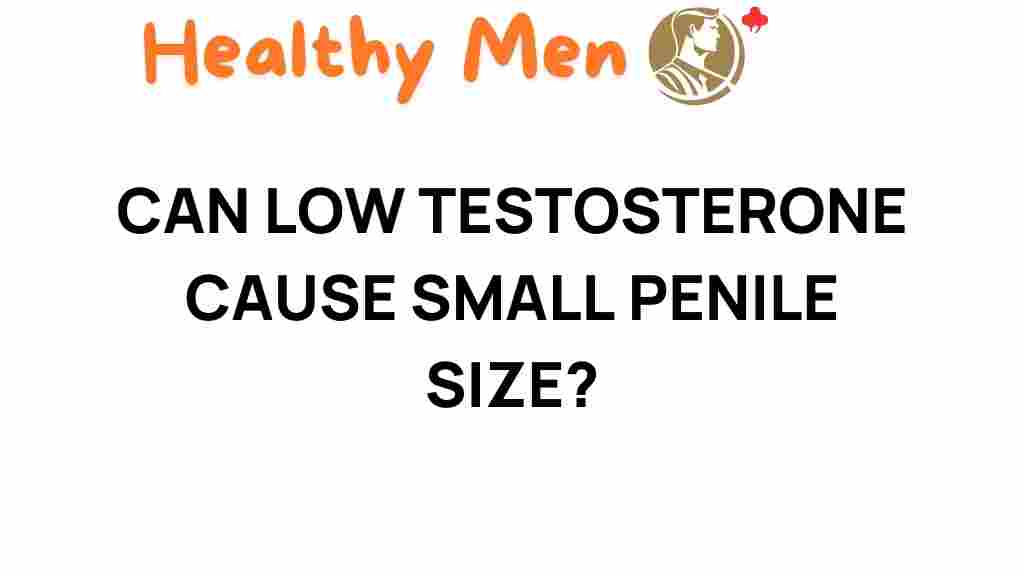The Surprising Link Between Low Testosterone and Penile Size
In the realm of men’s health, discussions about testosterone levels and their impact on various aspects of male anatomy are becoming increasingly common. One particularly intriguing topic that often arises is the relationship between low testosterone and penile size. Many men grapple with concerns about their body image, and understanding how hormone levels can influence physical attributes is essential. This article will delve into the connection between testosterone, penile size, and broader implications for sexual health.
Understanding Testosterone and Its Role in Male Anatomy
Testosterone is a vital hormone that plays a crucial role in male physiology. Produced primarily in the testes, this hormone is responsible for a variety of functions, including:
- Development of male reproductive tissues
- Promotion of secondary sexual characteristics, such as increased muscle and bone mass
- Regulation of libido and sexual function
Testosterone levels typically peak during adolescence and early adulthood, but they begin to decline gradually with age. This decline can lead to various symptoms, including decreased libido, fatigue, and changes in body composition.
The Impact of Low Testosterone on Penile Size
One of the lesser-known effects of low testosterone is its potential impact on penile size. While genetics primarily determines penile size, hormone levels can influence development. Here’s how:
- Developmental Impact: Testosterone plays a crucial role during puberty when the male body undergoes significant changes. Low testosterone levels during this period may result in incomplete development of male genitalia.
- Penile Tissues: Testosterone helps maintain the health and integrity of penile tissues. Insufficient levels may lead to changes in erectile function and size over time.
- Body Image and Confidence: A man’s perception of his penile size can be affected by his testosterone levels. Low testosterone can lead to feelings of inadequacy, impacting overall body image and self-esteem.
Exploring Medical Myths Surrounding Testosterone and Penile Size
There are numerous medical myths surrounding testosterone and its effects on the male body. Some of these myths include:
- Myth 1: Testosterone replacement therapy always increases penile size.
- Myth 2: Low testosterone is the sole cause of erectile dysfunction.
- Myth 3: All men with low testosterone will experience noticeable changes in penile size.
It’s essential to separate fact from fiction when discussing testosterone and its effects on male anatomy. While low testosterone can impact sexual health, it is often not the only contributing factor.
How Hormone Levels Affect Sexual Health
Testosterone is crucial for maintaining sexual health in men. Low levels can lead to:
- Decreased libido and sexual desire
- Difficulty achieving or maintaining erections
- Reduced sperm production
- Impaired mood and increased fatigue
Addressing low testosterone through lifestyle changes, medical intervention, or therapy can significantly improve these symptoms and enhance overall well-being.
Step-by-Step Process: Evaluating Testosterone Levels
If you suspect that low testosterone may be affecting your health and body image, here’s a step-by-step guide to evaluating your hormone levels:
Step 1: Recognize the Symptoms
Common symptoms of low testosterone include:
- Low libido
- Fatigue or decreased energy levels
- Depression or mood changes
- Loss of muscle mass
- Increased body fat
Step 2: Consult with a Healthcare Provider
Speak with a healthcare professional, preferably an endocrinologist, who specializes in hormone levels and men’s health. They can provide guidance and recommend appropriate tests.
Step 3: Get Tested
A simple blood test can determine your testosterone levels. It is typically done in the morning when testosterone levels are at their peak. Your doctor may check:
- Total testosterone
- Free testosterone
- Luteinizing hormone (LH)
- Follicle-stimulating hormone (FSH)
Step 4: Discuss Treatment Options
Based on your test results, your doctor may suggest:
- Lifestyle changes (diet, exercise, sleep)
- Testosterone replacement therapy (TRT)
- Addressing underlying health issues
Each treatment option has its benefits and risks, so it’s essential to have an open discussion with your provider.
Troubleshooting Tips for Managing Low Testosterone
Managing low testosterone involves more than just treatment; it also requires lifestyle adjustments. Here are some troubleshooting tips:
- Maintain a Healthy Weight: Excess body fat can lead to lower testosterone levels. Aim for a balanced diet and regular exercise.
- Exercise Regularly: Strength training and cardiovascular exercises can help boost testosterone levels naturally.
- Prioritize Sleep: Quality sleep is crucial for hormone production. Aim for 7-9 hours of sleep per night.
- Manage Stress: Chronic stress can negatively impact testosterone levels. Incorporate stress-reducing activities such as yoga or meditation.
The Broader Implications of Testosterone on Men’s Health
Understanding the role of testosterone in men’s health is critical. Beyond its influence on penile size and sexual health, testosterone affects:
- Bone density: Low levels can lead to osteoporosis.
- Muscle mass: Testosterone helps maintain muscle strength and mass.
- Mood and cognition: Hormonal imbalances can affect mental health and cognitive function.
Addressing low testosterone can lead to improvements not just in sexual health but also in overall quality of life.
Conclusion
The connection between low testosterone and penile size is a multifaceted issue that touches on various aspects of men’s health, sexual health, and body image. While low testosterone can influence male anatomy, it is essential to recognize that it is not the sole factor. Understanding the role of hormones, debunking medical myths, and taking proactive steps can empower men to take charge of their health.
If you’re experiencing symptoms of low testosterone, consider seeking advice from healthcare professionals and exploring treatment options. For more information on men’s health and hormonal treatments, check out this resource.
By understanding the surprising link between testosterone and penile size, men can better navigate their health and well-being in a society filled with misleading information and unrealistic expectations.
This article is in the category Conditions and created by healthymen Team
